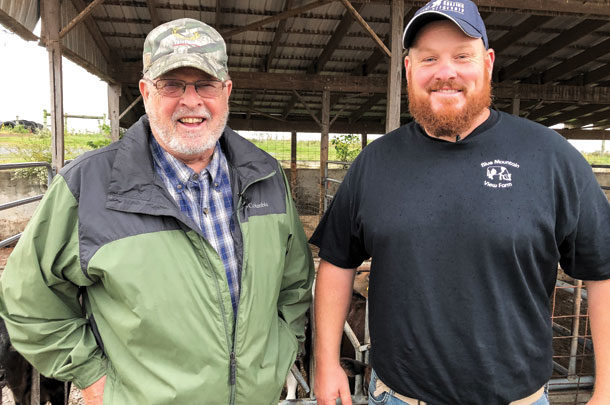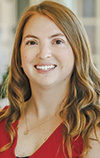With many dairy farmers working with family on a daily basis, it can sometimes be difficult to find an outside perspective.
Taking the time to build trustworthy relationships with advisers, nutritionists, accountants and other industry professionals can lead to long-term success, especially when these individuals come together as a team to help resolve conflicts and navigate decision-making.
During the Center for Dairy Excellence’s (CDE) final installment of the “People Side of Dairying” webinar series, Andy Bollinger and Matt Bomgardner – two Pennsylvania dairy producers – described how a team approach helped them make crucial decisions, identify bottlenecks and develop transition and transformation plans for the future of their operations.
Business planning and transition management
Andy Bollinger has witnessed multiple transitions and transformations to Meadow Spring Farm in Lititz, Pennsylvania, during his lifetime. After joining his family’s partnership in 2004, their farm used a team approach when making major changes to their operation. During the webinar, Bollinger shared how this way of thinking and willingness to step outside of his comfort zone has always been engrained in him.
“When I graduated high school, I went to a year of dairy management school. I think of this as my first ‘team,’ even though it wasn’t any sort of true advisory or transition team,” he said. “It certainly got me out of my comfort zone, and I saw a lot of different farms in that year. I didn’t get a degree from it, but I got a lot of life experience.”
When he returned back to the farm that year, his family broke ground on a new freestall barn, bunker silos and a step-up milking parlor. In 2002, they built another freestall barn and new manure pit, and in 2008, they decided to install a manure solids separator and stack shed to hold excess solids. Today, 100% of their cows’ manure goes through that separator, but it hasn’t been without its initial challenges.
“When we built the manure separator, we thought we were going to do a digester. It was kind of intriguing to me, and we heard a presentation about a new style digester that we thought sounded great,” he shared. “Eventually, we started to realize their technology was not proven and we wanted to back out. It was a messy situation, and it was probably one of the most stressful things I’ve dealt with. I’m not very confrontational, and it really weighed on us. However, it did lead us to good things.”
One of those things was a “Transformation Team” grant through the CDE, which was recommended by one of his consultants. The prospect of gathering fresh, new ideas interested the Bollinger family and, after being accepted into the program, they established a transformation team that consisted of their farm family, an accountant, lender, veterinarian, Penn State Extension representative, CDE representative, local businessperson and a facilitator.
Key focus areas
Bollinger said the team had six meetings and used that time to explore four key focus areas:
- Renewable energy and conservation efforts. The transformation team toured a few digesters in the area and helped the Bollingers decide whether it was a good fit for their farm. “I know they are working extremely well on some farms, but there was too much about it that didn’t feel like a good fit for ours. No key person wanted to manage it,” Bollinger said.
- Employee management. “One of our transformation team members had a great skill set in talking and interviewing people. We came up with a list of questions, and he sat down with each of our employees,” Bollinger shared. “He compiled their answers and shared the results with the whole team. Most of the feedback was positive, so it gave us a good boost. It helped us know how to handle people and handle different situations on the farm.”
- Viability of diversification and direct marketing. “We have seen a lot of farms do this very successfully, but we also felt like we do a good job producing milk at a low cost and making a living with just producing milk,” Bollinger said. “We decided to focus on ways to lower our cost of production to make ourselves even more competitive.”
- Business planning and strategic planning. “The transformation team helped us secure a PENNVEST grant, which helped us address some manure runoff concerns on the farm. We also did some number crunching on our old step-up parlor, which was 16 years old at that point. We realized by saving time in employee labor, we could pay the debt service on a newly constructed parlor.”
In addition to making transformations at the farm level, Bollinger also discussed the importance of establishing a transition plan among family members. His transformation team was a key part of helping his family navigate the process of transferring assets.
“Based on discussions we were having with the team, my parents really wanted to have a smooth transition of the farm in place for me and my wife,” Bollinger said. “Our accountant took charge of that and worked with an attorney to put together a transfer of assets, which also addressed my non-farming siblings. It helped to ensure they will receive value from the farm in the future and gave me the ability to continue farming for a long time.”
Today, the Bollinger family milks approximately 400 cows and excels with a 36% pregnancy rate. They have three full-time employees and as many as 20 part-time employees and continue to work with trusted advisers to make strategic decisions for their operation.
Profitability and mentorship
Matt Bomgardner from Blue Mountain View Farm in Lebanon, Pennsylvania, was the second dairy producer to share his experience during the webinar. With approximately 100 cows and 150 crop acres – 115 of those in pasture – Bomgardner described the moment he realized he needed an outside perspective to help him make significant changes to his operation.
After coming back to his family’s farm at the end of 2005, he was the third generation and excited to get back to dairy farming. His family began considering the idea of constructing a new dairy barn but realized there would be too much debt. They decided to build a new parlor and, in exchange, Bomgardner bought the cows.
“Within two weeks, the value of my cows was down 25 percent. It was a really bad start,” he said. “It got a little better over the next few years. Profitability was there for dairy farming, but it just didn’t seem to be working for us. In 2011, I went to a Center for Dairy Excellence event, and they mentioned profit teams. It was something that stuck with me. Things were bad, and I thought I was done with dairy farming, but there was something nagging me. I thought about giving the profit team a try.”
In September of 2011, Bomgardner received the profit team grant and they held their first meeting. The team discussed the idea of expanding but determined it wasn’t the right fit for the farm. Bomgardner enjoyed grazing, but he had not mastered the system for his operation.
“Someone on the profit team told me the center had a grazing adviser, so I was introduced to Duane Hertzler. He agreed to be on our team,” Bomgardner shared. “I can say that Duane saved the farm. With grazing, you need an adviser, and Duane was the perfect person.”
Bomgardner explained the importance of having mentors like Duane to evaluate his operation with a critical eye. He took the time to learn about their soil type and identify three key bottlenecks: below-average soil type, old facilities and high short-term debt.
After working together, Bomgardner learned the art of grazing and worked with his profit team and mentors to transition to more intensive grazing and add more pasture in 2012. In 2013, he completed an eight-week course on pasture-based dairies and began considering the transition to organic.
“I realized we needed an organic mentor in addition to Duane. I ended up adding another mentor, an organic inspector who had experience raising organic dairy cattle. It was the perfect fit,” he added.
While Bomgardner has added a new nutritionist, accountant, a second adviser and another loan officer to his team over the years, being able to trust everyone’s expertise is crucial when finding solutions to increase the profitability of his grazing operation.
“When you have people who are used to working with conventional dairies, it can be difficult to manage preconceived ideas. That’s where the mentors and advisers came in big time. It was Duane’s experience that they trusted,” Bomgardner shared.
A people-driven industry
Dairy is a community-driven and people-centered industry. Surrounding yourself with a circle of trusted advisers, and being open to feedback, can lead to new ideas that can improve the longevity of many farms.
“When you start a team, they’re going to start digging into your faults. Don’t take it personally. Listen to them. If you have advisers and you don’t listen to them, you’re wasting your money and time,” Bomgardner advised.






